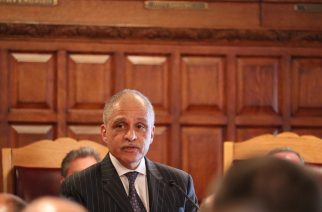
Sen. Michael Gianaris, center, stands with members of Voices Of Community Activists & Leaders (VOCAL-NY), along with fellow lawmakers Brian Benjamin, Jamaal Bailey, Michael Blake, Patricia Fahy, Joe Lentol, and Latrice Walker in February 2018. Bailey and Lentol sponsor a bill that would change the evidence discovery process so that attorneys in criminal cases get access to evidence sooner, sparing innocent people time in jail.
Darryl Herring spent 18 month in Rikers Island for a crime he didn’t commit. The lengthy stay in jail was was due solely to the prosecutor’s office not turning over evidence to Herring’s defense attorney. Once they did, the judge dismissed the case.
Herring was in Albany recently to push for a bill in the Senate and Assembly (S.1716/A.1431) that would give defense attorneys access to evidence they currently don’t get until the trial begins.
Known as the Discovery for Justice Reform Act, the legislation would require both the prosecution and the defendant to provide the opposing party with extensive discovery early in the case.
Proponents say it would eliminate burdensome requirements of routine discovery paperwork while including a mechanism for prosecutors with legitimate concerns about the safety of witnesses or on-going investigations to withhold or redact information and move for a protective order.
More than 15 organizations banded together during a recent day of action in the state Capitol to support those who have been wrongfully convicted because of the current “blindfold law.”
New York state is one out of four states to still use this discovery process, along with Louisiana, South Carolina and Wyoming. The blindfold law allows prosecutors in criminal cases to withhold evidence such as police reports and witness statements from the defense until the start of the trial, making it difficult for defense attorneys to prepare a case.
Andrew Kossover, of the State Association of Criminal Defense Lawyers, said the discovery process affects virtually every case in our criminal courts. “It has been 40 years since any meaningful revision to Article 240 of the Criminal Procedure Law, the statute that controls pre-trial discovery in criminal cases,” Kossover said.
The Senate bill is sponsored by Jamaal Bailey and the Assembly version is sponsored by Joe Lentol.
“We can no longer accept a bail system that creates and entrenches wealth and race-based disparities and feeds mass incarceration; a speedy trial law that allows cases to languish without a realistic opportunity to have one’s day in court; or a discovery law that deprives the accused of access to the most basic information about the case against them,” said Justine Olderman, executive director of The Bronx Defenders.
The Assembly and Senate versions of the bill reside in the Codes Committee in their respective houses.
“I want to see this bill pass before the budget passes,” said Bill Bastuk, president of It Could Happen To You, a criminal justice reform organization.









